African Grey Parrots are stunning and intelligent birds that can be great pets in the right home, but they require a great deal of love, attention, and exercise. We are sharing some tips on properly caring for African Grey parrots and what you can expect.
The most important Things you must Know About the African Grey Parrot

Weight: 15 to 18 ounces
Length: 13 inches
Lifespan: Can live up to 80 years
Physical Characteristics: Varying shades of Grey on the body, with striking red tail feathers
The African Grey parrot is believed to be one of the smartest birds in the world and is capable of learning over 1000 words and speaking sentences in the correct context. These beautiful and intelligent birds tend to form a very strong bond with one individual and are often remarkably in tune with their handler’s emotions. While these traits may seem appealing, African Grey parrots are not recommended for novice pet owners. These birds require a great deal of time with their owners, as well as plenty of puzzles and activities to keep their brains occupied, room to fly, and a reliable daily schedule.
Because of their outsized intelligence, these parrots need 5 hours of stimulation every day to keep from falling into boredom or depression. They are easy to train once one is familiar with using positive reinforcement and operant conditioning as training methods. Still, inexperienced bird owners are going to need to educate themselves on training techniques in order for the process to go smoothly.
African Grey Parrot’s Behavior and Personality

Most bird keepers think that an expert bird enthusiast should only keep a grey. They are sophisticated parrots that are nevertheless rather sensitive and demanding.
They are charming and intelligent, but their combination of sensitivity and intelligence can cause behavioral problems.
Since they’re creatures of habit, a sensitive grey might become upset by even the slightest deviation in routine.
Among other unpleasant habits, they are prone to feather plucking and gnawing.
They will tolerate light head scratches and petting but do not enjoy intense physical contact, though some individuals don’t mind a little snuggling.
Every bird has unique preferences and tastes. Even if every household member socializes with the Grey from the start, it still has the potential to become a “one-person bird.”
What type of cage does an African Grey parrot need?
Your African Grey parrot needs enough room to spread its wings and move from perch to perch without feeling restricted. The cage for your parrot should be made of non-toxic, durable, and clean materials. Perches need to be different in terms of height, width, and texture. Concrete perches can keep your Grey toenails clean. Perches should never be placed over water or food (to avoid contamination). Place your Gey in a safe, warm place that is free of drafts and has indirect sunlight. Don’t isolate your Grey. These social birds like to be part of the daily life of their owners.
What Kind of Diet and care Should we Feed our African Grey Parrot?

There’s a reason why the African Grey is often considered the poster bird for parrot intelligence — not only is this bird inclined to amass a large vocabulary, African greys also demonstrate an aptitude for recognizing the meaning of words and phrases.
African greys need plenty of toys that challenge their intelligence, such as foraging and puzzle toys. Nutri-Berries by Lafeber Company are perfect for foraging. This complete food blends a balance of grains, seeds, and other nutrients in the shape of a berry. Because the grains and seeds are mostly whole and formed into a berry shape, it encourages African greys to hold, nibble, and even play with the Nutri-Berries. This mimics the foraging that African greys do in the wild.
African greys seem especially affected by stress and commotion in their environment and can be put more at ease by placing one corner of the cage against a wall as opposed to in the middle of a room.
African grey parrots are more prone to deficiency in vitamin-A/beta-carotene and, therefore, benefit from eating vegetables high in beta-carotene, such as cooked sweet potato and fresh kale. Vitamin D deficiency is another concern, especially for greys on a poor diet. Offering a balanced, pelleted diet, such as Nutri-Berries, for the main diet of an African grey helps prevent vitamin and mineral deficiencies. A grey that consumes a pelleted diet generally does not need vitamin supplements added to its food.
Exercise:

Adequate amounts of activity are crucial to maintaining the health of an African grey parrot. Pet greys should be allowed to spend at least 1 to 2 hours out of their cages daily with vigorous exercise, and make sure to provide them with plenty of bird-safe chew toys to help exercise their powerful beaks.
Final thoughts :
To keep your African Grey Parrot healthy and happy, they should be examined by a qualified avian veterinarian once or twice a year. A vet that has specialized training in the care of exotics and avians can help provide your African Grey parrot with the care they need and deserve, as well as provide you with the guidance and advice you need to become the best Grey owner you can be. Routine preventive care, including fecal exams, blood tests, and vaccinations, plays a vital role in giving your African Grey their best shot at a long, happy, and healthy life.
Wing and nail trimming will also be required from time to time to keep your parrot looking and feeling great.
Without proper care at home and annual veterinary care, African Greys are prone to a number of problematic behaviors and health problems, including feather picking, fearfulness, aggression, respiratory illnesses, hypocalcemia syndrome, circovirus (PBFD virus), nasal blockages (bacterial, fungal, secondary to malnutrition), and proventricular dilatation disease (PDD)





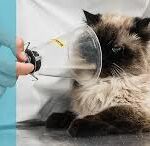









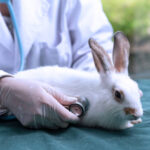
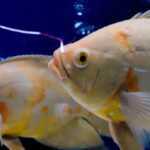


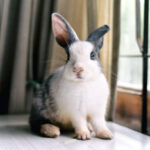


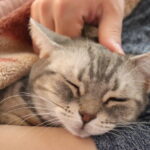





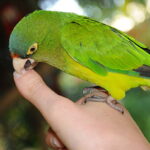

















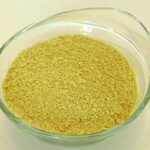











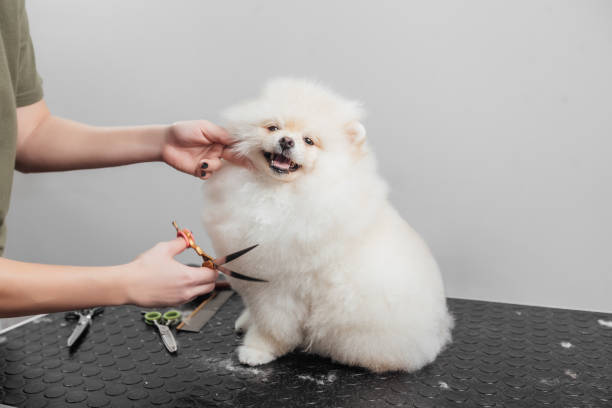


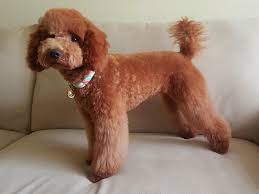
Marcos Rasmussen